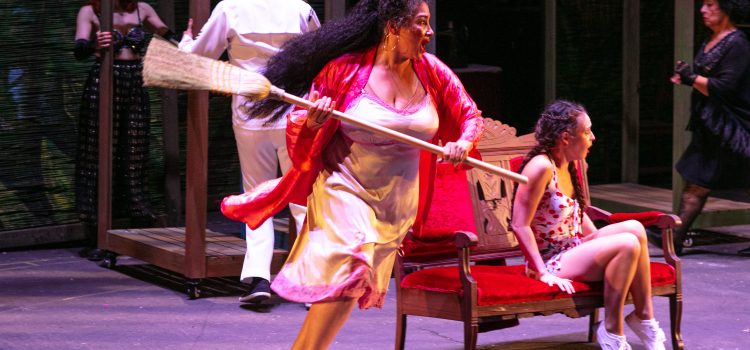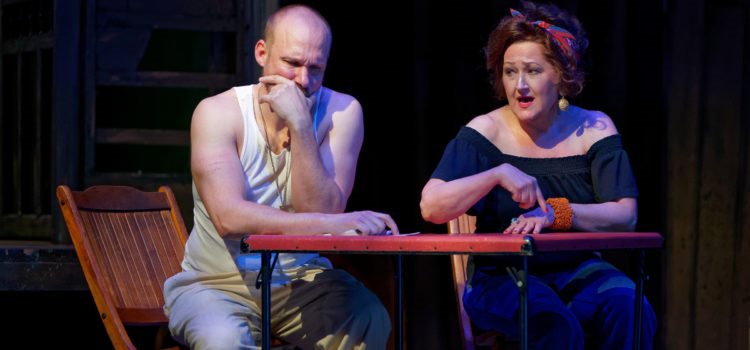By Lynn Venhaus
Emphasizing romantic symbolism along with its operatic life and death themes, an unconventional production of Tennessee Williams’ “The Rose Tattoo” is cleverly staged inside a Big Top ring, re-imagined as an Italian circus — complete with aerialists, animals, singers, musicians, and clowns.
The 1951 play is this year’s centerpiece for the seventh annual Tennessee Williams Festival St. Louis, one of my favorite not-to-be-missed events since 2016.
The Mississippi-born playwright, who spent his formative years in St. Louis, came to prominence in the 1940s, and in the decades following, cemented his place as one of the most significant playwrights of the 20th century. The festival celebrates his influence and art through his enduring works and early writings.
Always a detailed retrospective with speakers, education components, readings, films, tours and more, the fest’s fresh looks have a way of bringing out further insights during its 10-day schedule.
A bold and risky move, the exaggerated flourishes — while cinematic and reminiscent of Fellini fantasies — aren’t necessary to convey the heart of the matter, which is love in a time of chaos and the push-pull of grief, desire, and hope.
While the amusing accoutrements add to the production’s overall uniqueness, Williams’ poetic flair remains at center stage.
The nimble ensemble slips into the colorful characters that are part of an Italian immigrant community on the Mississippi gulf coast.
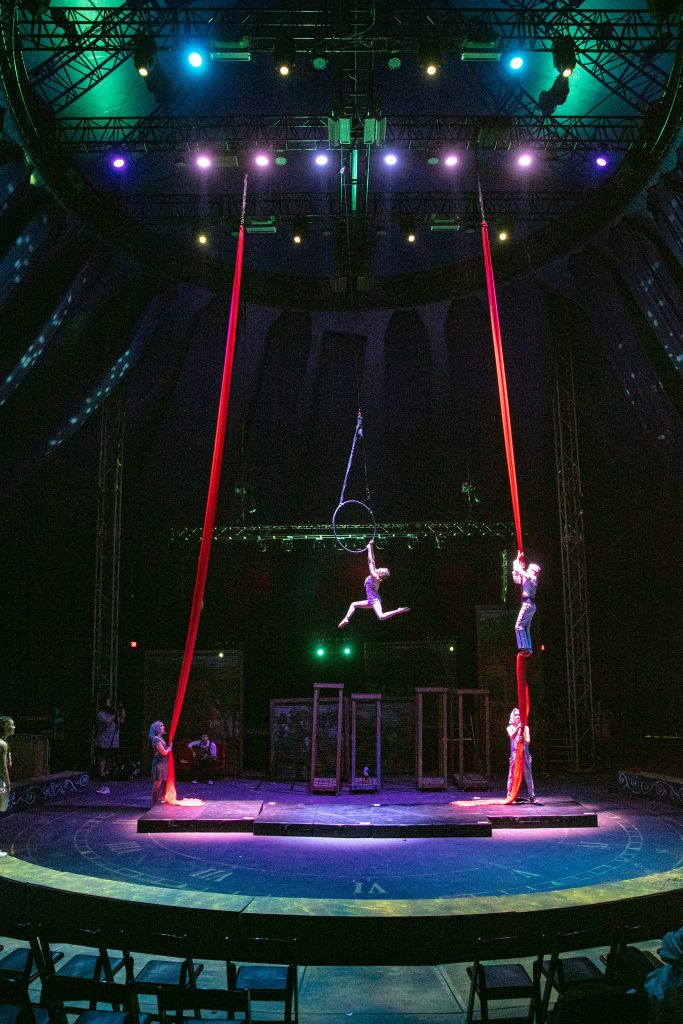
Williams’ play, which premiered in Chicago in 1950, became his fourth New York produced piece in 1951 after “The Glass Menagerie,” “A Streetcar Named Desire” and “Summer and Smoke.” It is his only one to win a Tony Award for Best Play.
Williams adapted the three acts for the movie in 1955, perhaps best known as the vehicle for which Anna Magnani won an Academy Award. The film was nominated for eight Oscars, also winning for cinematography and art direction.
Magnani, once described as the “volcanic earth mother of Italian cinema,” was a friend of the playwright. He wrote the part for her, considered her “the most explosive emotional actress of her generation.” But, thinking her English wasn’t up for the stage, she declined – and four years later, it was her first English language film role.
The earthy Serafina Delle Rose is an indelible heroine – suffering but not silent. Maureen Stapleton originated the role on Broadway, and Maria Tucci (1966), Mercedes Ruehl (1995) and Marisa Tomei (2019) played the tempestuous widow in subsequent revivals.
Under the Big Top, professional actress and academic Rayme Cornell commands the space as the fiery Sicilian seamstress.
Let’s face it, as written, both she and love interest Alvaro could be construed as antiquated over-the-top ethnic stereotypes. Chalk it up to dated material from 70 years ago. So, she and Bradley J. Tejeda walk a tightrope in dialect delivery.
Serafina is a complicated woman. Williams knows how to set up pain and passion, that’s for sure. Happily married to virile truck driver Rosario, Serafina discloses she is pregnant with her second child and that a rose tattoo appeared on her breast the night of conception, albeit temporary.
We never see Rosario but learn he ran black-market cargo for the mob underneath bananas and cheated with the delectably-named Estelle Hohengarten (Rachael Fox, on horseback). His life ends badly – shot, then his 10-ton truck crashes and bursts into flames.
Plunged into mourning, miscarriage, and misery, Cornell glowers, wails, and rages. In a well-worn pink slip, she deteriorates as a bitter recluse, refusing to face reality. A shrine to the Blessed Virgin Mary gives her sustenance.
You can’t tell by intermission, but “The Rose Tattoo” is a departure from Williams’ signature dramas. Considered more light-hearted, it still has his emotional whiplash.
Deep sorrow eventually yields to comedic interplay when a chance flirtatious encounter is life-changing.
That’s when the charming Tejeda swoops in as Alvaro Mangiacavallo, a buffoonish truck driver, and the play blossoms in his presence.
Tejeda, a New York-based actor and Yale School of Drama alum, has made his mark on local stages – first at St. Louis Shakespeare Festival in “Love’s Labour’s Lost” in 2019 and then the radio plays when the festival pivoted in 2020.
Last year, he brought both a sweetness and restlessness to Tom Wingfield, an extraordinary performance in the triumphant production of “The Glass Menagerie” outside at the Central West End apartment where Williams once lived.
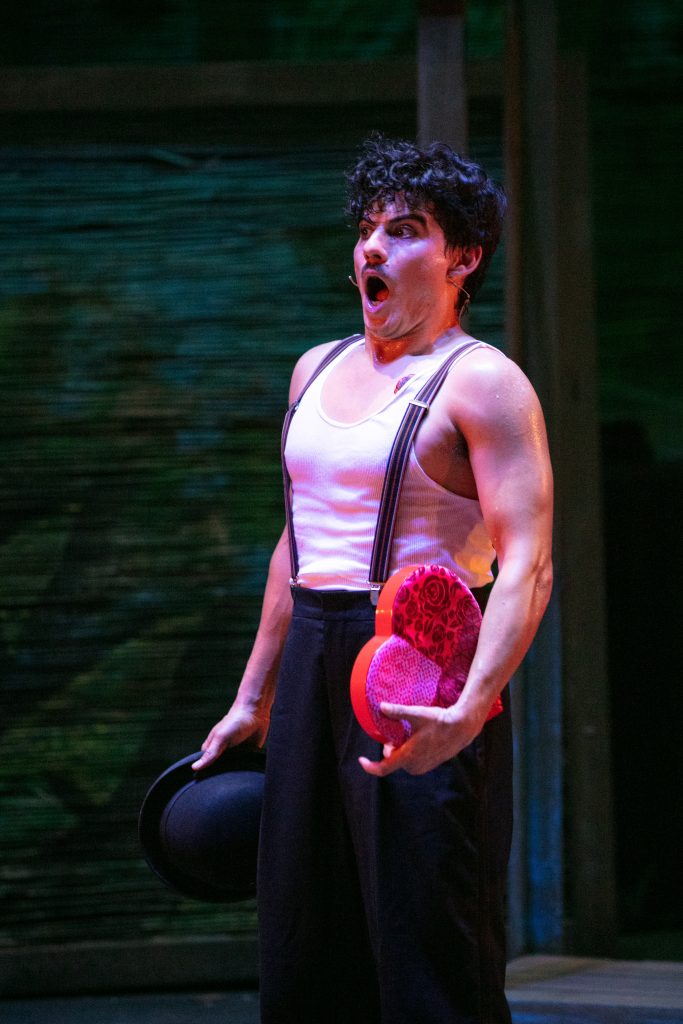
As Alvaro, he demonstrates his prowess in physical comedy, channeling Charlie Chaplin in looks and expressions, acrobatic in slapstick and darting around the set. It’s a splendid performance, injecting the play with a needed boost of vitality.
He easily won over the audience, especially when he joked that his last name Mangiacavallo means “eat a horse.”
“It’s a comical name, I know. Maybe two thousand and seventy years ago one of my grandfathers got so hungry that he ate up a horse. That ain’t my fault,” he said, eliciting laughter.
Serafina describes him as having a clown’s face on her late husband’s body. Even with their skilled performances, Cornell and Tejeda do not spark any sensuality.
But the young couple revealing an attraction that blooms into love does. Valentina Silva, memorable in Metro Theater Company’s “Last Stop on Market Street” last winter, plays Serafina’s smart, sheltered, and neglected 15-year-old daughter, Rosa Delle Rose, with youthful elan.
Stifled by her mother during the three years since her father’s accident, Rosa rebels, wanting to go out and have some fun. You feel her yearning for freedom, eager to take flight.
She is infatuated with a wholesome sailor, Jack Hunter, who was immediately smitten with the vivacious teen at a school dance. Oliver Bacus, who is quickly making a name for himself on local stages, seen last month in The Midnight Company’s seismic “Rodney’s Wife,” eloquently delivers Williams’ distinct dialogue.
Their innocent love story is a catalyst for Serafina to change, to let go, and that is illustrated by aerialists Annika Capellupo, Natalie Bednarski, Sage McGhee and Maggie McGinness of On the Fly Productions, with choreography by owner Jason Whicker. It is a lovely, graceful sight — but does this illuminate or distract?
The aerialists use satiny scarlet ribbons of fabric, which is the shade of a shirt Serafina is sewing, requested by her husband’s mistress to give her “wild like a gypsy” beau on their one-year anniversary, which is the last day he’s alive.
So much of Williams’ writing deals with symbols – consider the rose itself, with red buds a sign of romance, love, beauty, and courage. Here, it is a symbol of new beginnings too.
Understanding Williams’ dreams and desires has always been part of the fest, and the focus on Italy explores how visiting the country, soon after his first wave of success, was restorative to his psyche.
Giddy with fleeting joy and discovery of his new happy place, Williams dedicated his “love-play to the world” to his partner, Frank Merlo, an Italian American from New Jersey who served in the U.S. Navy during World War II: “To Frankie in Return for Sicily.” They met in 1948 in Provincetown, Mass., and spent 15 years together. Merlo died of lung cancer at age 43 in 1963 while Williams lived to age 71, passing in 1983.
The supporting cast captures the local flavor, and the quirky people he immortalized on paper.
Assunta, Serafina’s friend with psychic abilities, is played by Carmen Garcia with an air of mystery. She senses that “something wild is in the air.” Holly Maffitt is the “Strega,” considered a traditional witch, because the fates are part of this narrative.
Tyler White, a lively presence whenever on The Black Rep’s stage, is delightful as part of the neighborhood’s gossipy hens, as is Julia Crump as perky busybody Bessie.
Harry Weber is both teacher Miss Yorke and Father De Leo, the community’s strict moral gatekeeper.
The always fun to watch Mitchell Henry-Eagles enlivens the proceedings as an accordion-playing salesman and a doctor. Tony Viviano occasionally pops up to sing.
They serve as a Greek chorus of sorts, observing, moving in and out. Director David Kaplan likes to keep the players in motion, engaging the audience, and breaking the fourth wall.
Kaplan is well-versed in Williams’ aesthetic as one of the preeminent interpreters of his works. He is the curator and co-founder of the Provincetown Tennessee Williams Festival, now in its 17th year.
St. Louis experienced his perceptive vision in the dynamic “The Rooming House Plays,” four short plays he staged in the Stockton House, a local Victorian mansion, for the 2016 inaugural fest.
Williams’ works on longing and loss always move me more when we are in close quarters or exposed to a different canvas, so that I can feel the lyricism, make a specific connection. So, the cavernous Big Top was a challenge, but the cast’s immersion helped considerably.
James Wolk’s innovative set brought out an entirely new dimension, using multiple frames and shutters to stand in for doors and windows. The versatility punctuated the scenes, and the cast, adept at quick changes, did not lose a beat. Obviously, well-rehearsed, and efficient work by all.
The sound, however, had some issues Friday but was worked out. Designer Nick Hime engineered the sound and operated the board.
Jess Alford’s lighting design made use of dusky twilight in the early evening. Michele Friedman Siler’s thoughtful costume design differentiated the characters, and she effectively mixed textures.
This daring production has many moving parts, including four goats and a horse, which is difficult to pull off smoothly, and the esprit de corps is apparent. Stage Manager J.M. Bock and assistant stage manager J. Myles Hesse kept it flowing smoothly.
Williams was fascinated by the ebb and flow of time, which is a major component here. Between 1948 and 1959, he had seven plays produced on Broadway. This early one, however, is one of the few happy endings – because they found love in a hopeless place.
The Tennessee Williams Festival St. Louis presents “The Rose Tattoo” Thursdays through Saturdays at 7:30 p.m. and Sundays at 3 p.m. through Aug. 28 at The Big Top in Grand Center, 3401 Washington Avenue. For more information and tickets, visit www.twstl.org, and for a complete schedule of events.
The schedule includes a free showing of “The Roman Spring of Mrs. Stone,” based on Williams’ novel which he adapted for the screen in 1961, starring Vivien Leigh and Warren Beatty. It will take place at 8 p.m. on Wednesday, Aug. 24, at St. Ambrose Church on the Hill, 5130 Wilson Avenue.
A Bocce Tournament starts at noon on Saturday, Aug. 27, at the Italia-America Bocce Club, 2210 Marconi Avenue.
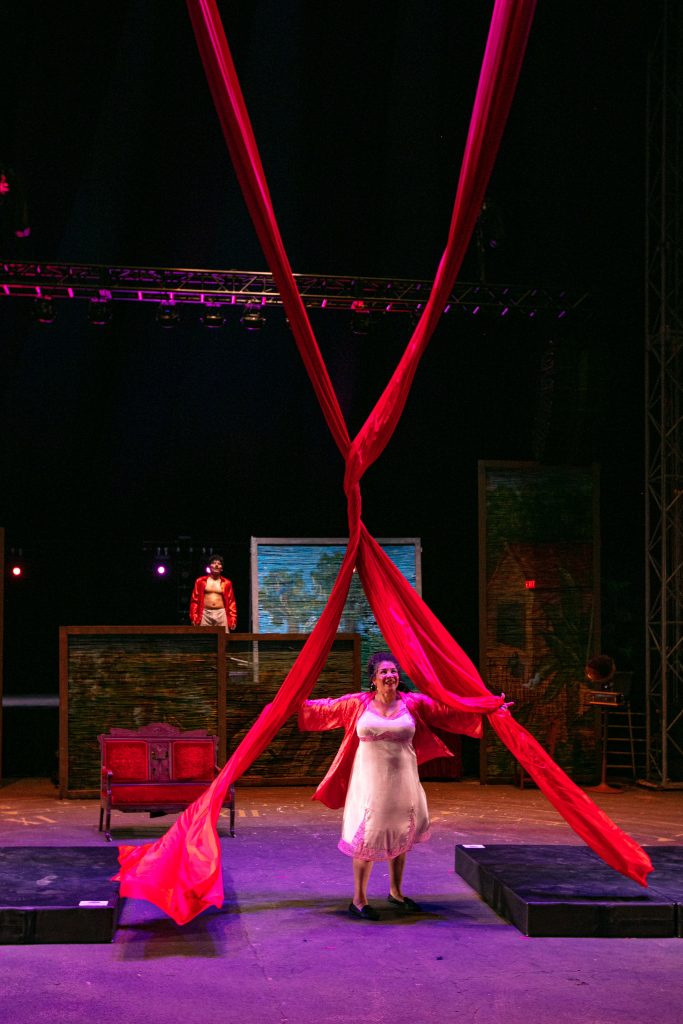

Lynn (Zipfel) Venhaus has had a continuous byline in St. Louis metro region publications since 1978. She writes features and news for Belleville News-Democrat and contributes to St. Louis magazine and other publications.
She is a Rotten Tomatoes-approved film critic, currently reviews films for Webster-Kirkwood Times and KTRS Radio, covers entertainment for PopLifeSTL.com and co-hosts podcast PopLifeSTL.com…Presents.
She is a member of Critics Choice Association, where she serves on the women’s and marketing committees; Alliance of Women Film Journalists; and on the board of the St. Louis Film Critics Association. She is a founding and board member of the St. Louis Theater Circle.
She is retired from teaching journalism/media as an adjunct college instructor.

